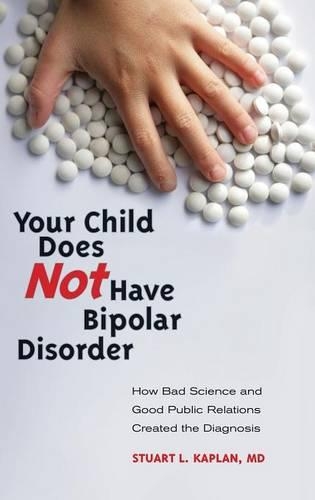
Your Child Does Not Have Bipolar Disorder: How Bad Science and Good Public Relations Created the Diagnosis
(Hardback)
Publishing Details
Your Child Does Not Have Bipolar Disorder: How Bad Science and Good Public Relations Created the Diagnosis
By (Author) Stuart L. Kaplan M.D.
Bloomsbury Publishing PLC
Praeger Publishers Inc
3rd March 2011
United States
Classifications
General
Non Fiction
Parenting, parenthood: advice, topics and issues
618.92895
Physical Properties
Hardback
208
Width 156mm, Height 235mm
454g
Description
An eminent child psychiatrist provides an insider's, whistle-blowing perspective on the promotion of a diagnostic entity that does not exist. Your Child Does Not Have Bipolar Disorder: How Bad Science and Good Public Relations Created the Diagnosis examines this diagnostic fad through a variety of lenses. Author Stuart L. Kaplan, MD, draws heavily on his forty years of experience as a clinician, researcher, and professor of child psychiatry to make the argument that bipolar disorder in children and adolescents is incorrectly diagnosed and incorrectly treated. As Dr. Kaplan explains, the dramatic rise in this particular diagnosis is not based on scientific evidence, nor does it reflect any new discovery or insight about the etiology or treatment of the disorder. In fact, the opposite is the case: the scientific evidence against the existence of child bipolar disorder is so strong that it is difficult to imagine how it has gained the endorsement of anyone in the scientific community. Your Child Does Not Have Bipolar Disorder: How Bad Science and Good Public Relations Created the Diagnosis explains to parents and professionals the faulty reasoning and bad science behind the misdiagnosis of childhood bipolar disorder. Dr. Kaplan critiques the National Institute of Mental Health, academic child psychiatry, the pharmaceutical industry, and the media for their respective roles in advocating this diagnosis. He describes very clearly what the children and adolescents actually do have, explains how it should be treated, and provides real-life clinical scenarios and approaches to treatment that work.
Reviews
Your Child Does Not Have Bipolar Disorder is a well-organized and readable critique of the diagnosis of pediatric bipolar disorder that presents strong evidence that bipolar disorder does not exist in children under the age of 12. . . . We recommend this book for child psychiatrists, parents, pediatricians, general practitioners, and other health professionals who treat this difficult pediatric population. With the ongoing controversy surrounding the diagnosis of pediatric bipolar disorder, it is imperative that health professionals take the initiative to educate themselves, and this book is a welcome vehicle to guide critical appraisal of the relevant literature from Dr. Kaplan's perspective. It could also serve as an invaluable tool for parents struggling with difficult-to-manage children and perhaps provide some guidance and clarity around more appropriate diagnosis and evidence-based interventions. * Canadian Journal of Child and Adolescent Psychiatry *
Author Bio
Stuart L. Kaplan, MD, is clinical professor of psychiatry at Penn State College of Medicine, Hershey, PA.
